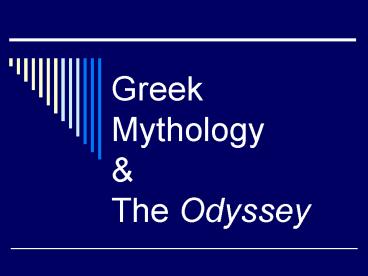Greek Mythology - PowerPoint PPT Presentation
1 / 12
Title:
Greek Mythology
Description:
Can be proven through repeated controlled experiments and observation. Cannot be subjected to repeated ... Aphrodite: goddess of love, beauty, and fertility ... – PowerPoint PPT presentation
Number of Views:372
Avg rating:3.0/5.0
Title: Greek Mythology
1
Greek MythologyThe Odyssey
2
What is a myth?
3
Important Figures in Mythology
- Aphrodite goddess of love, beauty, and fertility
- Apollo god of poetry, music, prophesy, and
healing - Ares god of war and warlike frenzy
- Artemis virgin goddess of the hunt
- Athena goddess of wisdom, war, and peace
- Cronus a Titan who ruled the universe until Zeus
took over - Hephaestus god of metalworking
- Hades god of the underworld, brother to Zeus
- Hera goddess of marriage, wife and sister of
Zeus - Hermes messenger god
- Poseidon god of the sea, brother of Zeus
- Zeus ruler, supreme God of all the Olympians
4
Homer
- probably lived and composed the Iliad and the
Odyssey in part of the Greek world - Ionia
between 850 and 650 B.C. - Approx. 550 B.C. these orally transmitted epics
were put into writing.
5
Rhapsodoi
- bards, professional singers and reciters who
traveled throughout the Ionian colonies with
songs and stories. One of these rhapsodoi was the
man we know as Homer.
6
Muse
- 9 daughters of Zeus and Mnemosyne
- small goddesses each assigned to a specific art
form - Custom of invoking the muse based on idea that a
poet could achieve immortality for himself and
the people he wrote about only with divine
assistance - Calliope the muse of epic poetry
7
Literary conventions for the epic - established
by Homer
- the theme of the epic should be the adventures of
a cultural heroa hero who embodies the virtues
or characteristics admired by his people. - the epic should begin with an invocation of the
muse and the statement of theme. - the story should begin in medias resin the midst
of the action (Latin).
8
Conventions (ctd.)
- 4. the poetic language should include traditional
epithets and lengthy similes. - 5. there should be intervention by divine beings
into human affairs. - 6. somewhere in the story the epic hero should
descend to the underworld.
9
How did the rhapsodoi commit long poems to
memory?
- REPETITION
- - of whole lines or clauses in describing similar
situations. - EX. when the dawn showed again her rosy fingers
and all the journeying ways were darkened
description of the beginning and the end of a
day.
10
- Committing poems to memory (ctd.)
- Notice the frequent occurrence of the
following - constructions
- What sort of word escaped your teeths barrier?
- But when they had put away their desire for
eating and drinking - On the sea where the fish swarm
- Sitting well in order we dashed the oars in the
grey sea - And the proud heart in us was persuaded
- In the division of his heart this way seemed best
to him - Sometimes the rhapsodoi repeated exactly lengthy
passages when the narrative allowed it (compare
Penelopes weaving in II and XIX).
11
How did the rhapsodoi commit long poems to
memory?
- Epithets
- - Short, stock adjective or adjectival phrases
that define a distinctive quality about a person
or a thing - EX. many-minded Odysseus
- swift-footed dogs
- life-killing drug
- early born, rosy-fingered dawn
- Your turn!
- Make up an epithet for
- a family member, a coach, a pet, political
figure, or a movie star. - Yourself
- A teacher
12
How did the rhapsodoi commit long poems to
memory?
- Epic similes
- -compare heroic events in the story with common,
everyday events - As . So. Pattern
- EX. As a man may cover a torch with black
embers/ At the edge of a field, where no
neighbors may be by,/ And save the fires seed,
so he need not light it from elsewhere./ So
Odysseus covered himself with leaves































